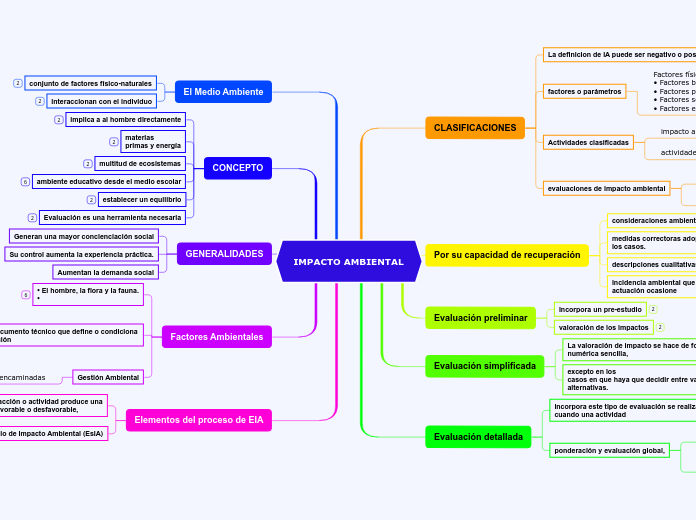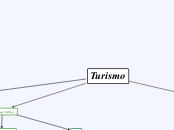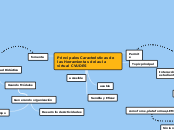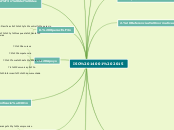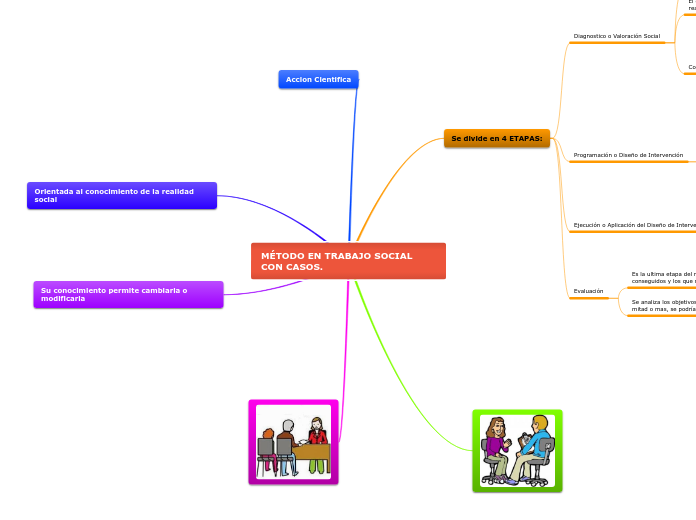PRESENTADO POR: ALEXANDRA FLOREZ MONTOYA
IMPACTO AMBIENTAL
The part of speech is a category to which a word is assigned according to its syntactic functions. In English the main parts of speech are noun, pronoun, adjective, determiner, verb, adverb, preposition, conjunction, and interjection.
Elementos del proceso de EIA
Estudio de Impacto Ambiental (EsIA)
Se trata de presentar la realidad objetiva
es un elemento de análisis que interviene de manera esencial
cuando una acción o actividad produce una
alteración, favorable o desfavorable,
Factores Ambientales
A conjunction is a word like 'if' 'but' or 'and' which is used to connect sentences or clauses together.
Gestión Ambiental
acciones encaminadas
conservación, defensa, protección y mejora del Medio Ambiente,
Es todo documento técnico que define o condiciona la localización
Subordinating conjunctions are conjunctions that are used at the beginning of subordinate clauses. Some examples of these conjunctions are: although, after, before, because, how, if, once, since, so that, until, unless, when etc.
Estudio de los animales y las plantas en relación con sus hábitats y costumbres
ECOLOGÍA Y PROYECTO
• El hombre, la flora y la fauna.
•
Coordinating conjunctions always connect phrases, words, and clauses. They are: for, and, nor, but, or, yet, so.
• Los bienes materiales y el patrimonio cultura¡.
anteriores.
• El suelo, el agua, el aire, el clima y el paisaje. Las interacciones entre los
• El hombre, la flora y la fauna.
This stew is savory and delicious.
GENERALIDADES
An interjection is used to express emotion in a sentence.
Think of other interjections!
Aumentan la demanda social
Su control aumenta la experiencia práctica.
Generan una mayor concienciación social
CONCEPTO
An adverb is used to describe a verb, but it can also describe an adjective or another adverb.
Adverbs normally help paint a fuller picture by describing how something happens.
Evaluación es una herramienta necesaria
Especially, Specifically, Merely, Either
establecer un equilibrio
A lot, Little, Much
ambiente educativo desde el medio escolar
The intensifiers strengthen adverbs adjectives and adverbs and down- toners make them weaker.
down-toners
Fairly, Rather
intensifiers
Extremely, Very
multitud de ecosistemas
Just, Afterward, Soon, Currently
materias
primas y energía
Always, usually, Never
implica a al hombre directamente
Carefully, Slowly
El Medio Ambiente
A numeral is a word or phrase that describes a numerical quantity.
Some theories of grammar use the word 'numeral' to refer to cardinal numbers that act as a determiner to specify the quantity of a noun, for example the 'two' in 'two hats'.
interaccionan con el individuo
One, two..
conjunto de factores físico-naturales
First, second..
Evaluación detallada
An article is a word used to modify a noun, which is a person, place, object, or idea. Technically, an article is an adjective, which is any word that modifies a noun.
ponderación y evaluación global,
Indefinite articles are the words 'a' and 'an.' Each of these articles is used to refer to a noun, but the noun being referred to is not a specific person, place, object, or idea. It can be any noun from a group of nouns.
estudio más completo y que más adelante se contemplará con detalle.
medidas correctoras, estudio de alternativas
incorpora este tipo de evaluación se realiza
cuando una actividad
It refers directly to a specific noun or groups of nouns.
The breakfast on my plate.
Evaluación simplificada
A pronoun is a word that can be used in place of a noun, typically after the noun itself has already been stated.
excepto en los
casos en que haya que decidir entre varias alternativas.
A reflexive pronoun ends with ...self or ...selves and refers to another noun or pronoun in the sentence (usually the subject of the sentence). The reflexive pronouns are myself, yourself, herself, himself, itself, ourselves, yourselves, and themselves.
Itself, Himself
La valoración de impacto se hace de forma numérica sencilla,
Possessive pronouns are used to show possession. The possessive pronouns are mine, yours, his, hers, ours, and theirs.
His, Your
Evaluación preliminar
An adjective is a word that's used to describe a specific noun and to provide more detail to the listener.
valoración de los impactos
Superlative adjectives demonstrate a higher level of comparison between entities.
She is the prettiest princess.
Incorpora un pre-estudio
Expresses a comparison between two entities or groups of entities in quality or degree.
He is taller than she is.
Por su capacidad de recuperación
A noun is defined as a person, place, thing or idea. Proper nouns always begin with a capital letter. Common nouns, which are general words, such as 'cars,' are not capitalized.
incidencia ambiental que la
actuación ocasione
Compound nouns are words where two nouns have been stuck together to make a new noun. Compound nouns should be written as one word, without a hyphen.
Candlestick
descripciones cualitativas
A noun which refers to a group of things/people.
Family, Class
medidas correctoras adoptadas según
los casos.
Countable nouns are nouns that can be counted, even if the number might be extraordinarily high.
Uncountable nouns are nouns that come in a state or quantity which is impossible to count; liquids are uncountable, as are things which act
like liquids.
Cats, Rain
consideraciones ambientales
Proper nouns are the names of specific people or places. They should always begin with a capital letter.
Mary, Paris
CLASIFICACIONES
A verb is an action word or 'doing' word that signifies movement in some way.
evaluaciones de impacto ambiental
An auxiliary verb helps the main (full) verb and is also called a 'helping verb.' With auxiliary verbs, you can write sentences in different tenses, moods, or voices.
Aguas continentales
Ambiente atmosférico
Actividades mineras a cielo abierto
Actividades clasificadas
A participle is a verb form that can be used as an adjective or to create a verb tense. There are two types of participles: Present participle (ending -ing) and Past participle (usually ending -ed, -d, -t, -en, or -n).
actividades clasificadas
molestas, insalubres, nocivas y peligrosas.
categorías siguientes:
impacto ambientales
• De las aguas continentales.
• De las actividades mineras extractivas a cielo abierto.
• De la protección del ambiente atmosférico.
De las actividades clasificadas como molestas, insalubres, nocivas y peligrosas.
factores o parámetros
A modal is a type of auxiliary (helping) verb that is used to express: ability, possibility, permission or obligation. The main modal verbs in the English language are: can, could, may, might, must, shall, should, will, would.
Factores físico - químicos.
• Factores biológicos.
• Factores paisajísticos.
• Factores sociales, culturales y humanos.
• Factores económicos.
La definicion de IA puede ser negativo o positivo
A verb with its own meaning: a verb that is not an auxiliary verb.
Create sentences
They have it.
